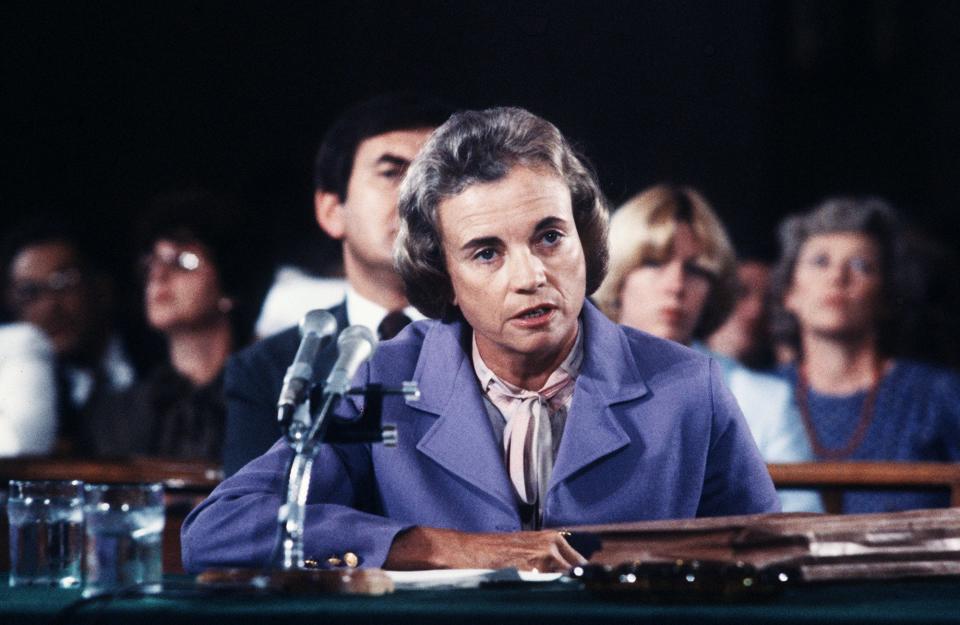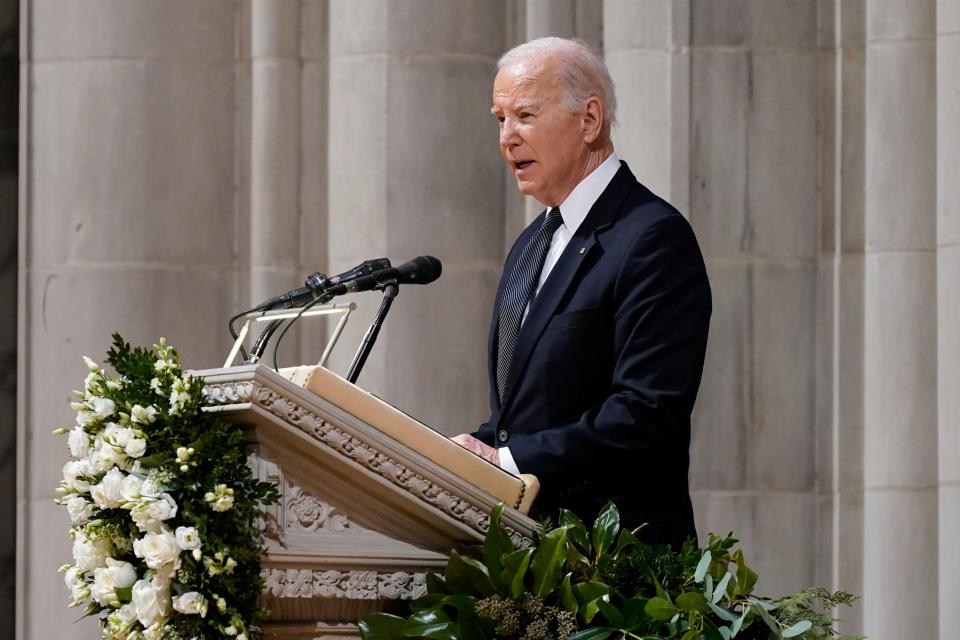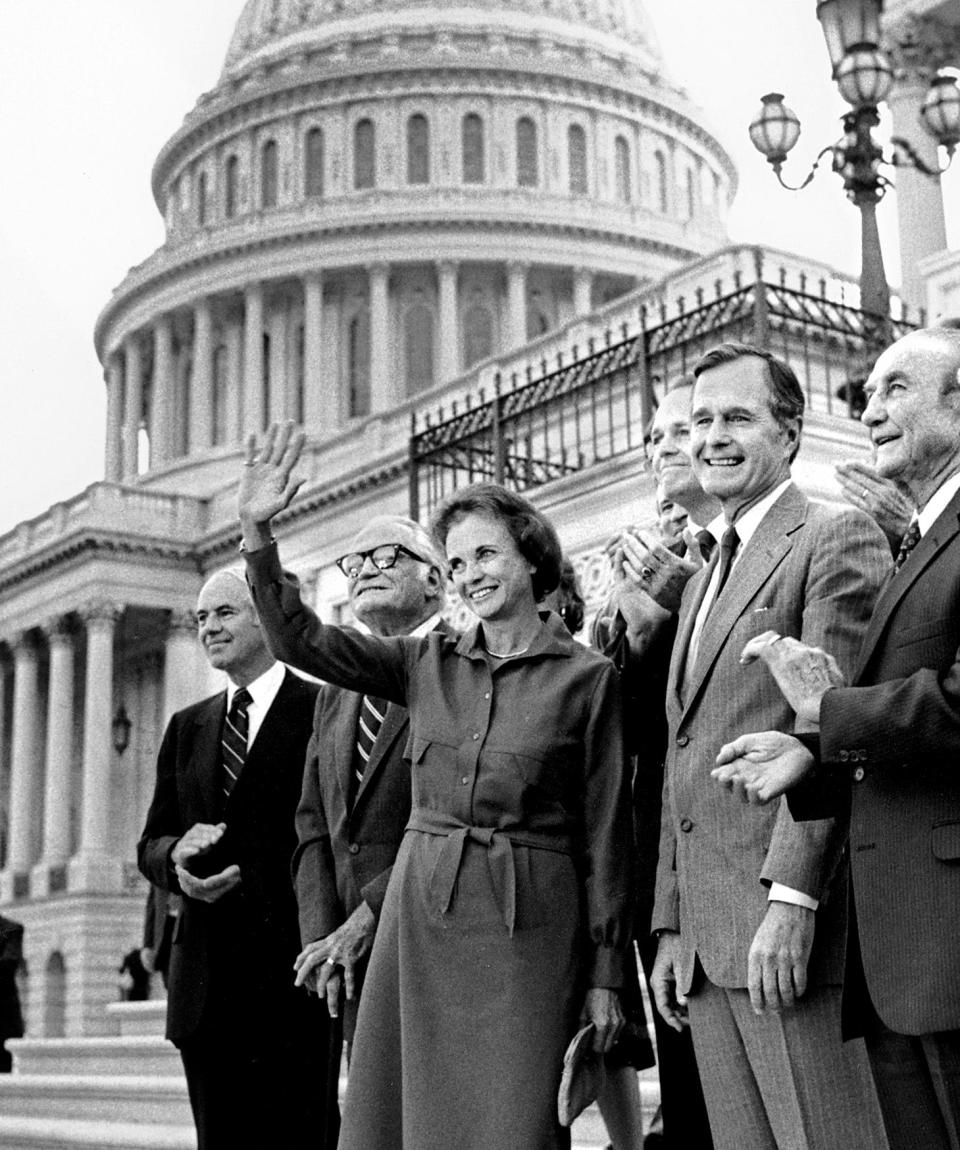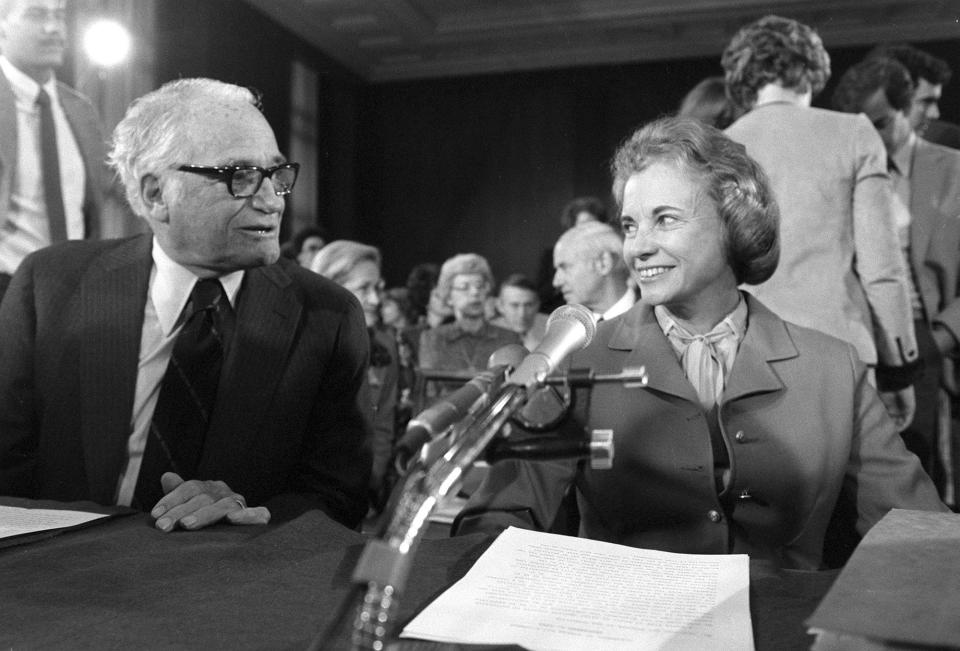Sandra Day O'Connor was the first woman justice. Biden wanted her to own it
- Oops!Something went wrong.Please try again later.
This story has been updated to clarify that Joe Biden served as the top Democrat on the Senate Judiciary Committee when William Rehnquist was nominated to be chief justice of the Supreme Court.
WASHINGTON – When then-Sen. Joe Biden quizzed Sandra Day O’Connor in 1981 about the kind of Supreme Court justice she would be, he also had a question about her off-the-bench activities.
Would O’Connor use her high profile to promote a Constitutional amendment that would explicitly declare that women have equal rights under the law, Biden asked during her Senate confirmation hearings.
“I just do not want you to wall yourself off, Judge. You are a tremendous asset,” Biden told O’Connor, after she’d politely told him such activism for the Equal Rights Amendment “would be inappropriate.” “It is your right, if it were your desire, to go out and campaign very strongly for the ERA. It is your right to go out and make speeches across the country about inequality for women, if you believed it…You have an obligation, it seems to me, to women in this country to speak out on those issues that you are allowed to under the canons of ethics.”
Biden’s impassioned plea elicited applause from some members of the audience in the packed hearing-room who were supposed to stay silent. But it failed to persuade O’Connor, who kept any additional thoughts to herself. In fact, O’Connor appeared “somewhat startled” by Biden’s entreaty, The New York Times noted at the time. With her family behind her, O’Connor had faced the all-male Judiciary Committee for three days of hearings, sitting “with her ankles crossed, gravely heeding each speaker with composed attention,” wrote Washington Post columnist Mary McGrory.

O’Connor may not have championed the ERA, but she nonetheless, in Biden's words, "helped empower generations of women in every part of American life."
"Sandra Day O'Connor, daughter of the American West, was a pioneer in her own right, breaking down the barriers in legal and political worlds and the nation's consciousness," Biden said at her funeral Tuesday.
Operating under great pressure and scrutiny, O'Connor proved "that a woman cannot only do anything a man can do, but many times do it a heck of a lot better," he continued.

In a statement after her death, Biden recalled the hope that surrounded her nomination.
The 99-0 vote to confirm her nomination, Biden said, was “proof that our nation can come together to move history forward.”

Before that vote, Biden mused on the Senate floor about how it was possible that senators on both sides of the ideological divide could agree on a nominee. Both conservatives and liberals were anticipating how they hoped she would rule on issues, something Biden said is impossible to predict.
“There is a huge amount of whistling in the graveyard about what kind of justice Judge O'Connor will be,” Biden said. “It would be my guess, if I had to guess, that she will be a fairly moderate justice.”
He turned out to be right. In O’Connor’s nearly a quarter century on the court, she became a key swing voted as she tried to find compromises to some of the nation’s most vexing controversies.
Biden, who said he didn’t always agree with her opinions, said O'Conner was “committed to the stable center, pragmatic and in search of common ground” – a description he would like others to use for his own approach.
O'Connor's impact A look at some of Sandra Day O'Connor's biggest Supreme Court decisions
O'Conner twice joined a majority of justices in upholding Roe v. Wade, the 1973 decision that established a constitutional right to abortion before that decision was reversed in 2022.
How she would rule on the issue was of top concern at her confirmation hearing. Her nomination was opposed by anti-abortion groups who worried – correctly, it turned out – that she would not overturn Roe v. Wade.
Despite the 99-0 vote for her confirmation, that outcome wasn’t a slam dunk, Robert McConnell, the Justice Department official who guided her through the confirmation process, said in a 2015 oral history interview.
“I don’t know of any nominee since who has had to go through picket lines to get to courtesy calls,” he said of shepherding her around the Capitol to meet with senators. “There were placards, `Vote No on O.’”
Because of the historic nature of her nomination, there were more requests for press credentials to cover the first woman nominated to the Supreme Court than there had been for the Senate’s Watergate hearings in 1973.
And the hearings were televised live on cable TV, another first for a Supreme Court nomination.
O’Connor was also the first nominee Biden had a lead role in questioning after becoming, months earlier, the top Democrat on the Judiciary Committee, a panel that became central to his Senate legacy.
Her hearings were not the contentious affairs Biden later chaired for the nominations of Robert Bork and Clarence Thomas, two of the six Supreme Court confirmations he oversaw as head of the committee. He earlier served as the top Democrat for the hearings of O’Connor, Antonin Scalia and William Rehnquist nomination as chief justice.

During her hearings, O’Connor said she was personally opposed to abortion but would base any decision on the facts of a case and applicable law, not on her personal views.
Biden said that both the questioning of her personal views on abortion and her distinction between those views and what she would or wouldn’t do on the court were “equally appropriate.”
During his floor remarks before the vote, Biden said he believed Roe v. Wade had been incorrectly decided, “but the fact of the matter is that the court has made a decision with regard to abortion.”
When the court upheld Roe v. Wade in a 1992 decision that O’Connor helped write, Biden supported that ruling. And since the court overturned Roe last year, Biden’s opposition to that decision and his support for abortion rights have become a centerpiece of his re-election campaign.
Biden, however, did not mention abortion in the statement he released after her death.
He spoke broadly of her impact and said he admired O’Connor for “her decency and unwavering devotion to the facts, to our country, to active citizenship and the common good.”
“She knew that for democracy to work,” Biden said, “we have to listen to each other, and remember how much more we all have in common as Americans than what keeps us apart.”
Dig deeper: Sandra Day O'Connor reached for a middle ground. Would she fit in at the Supreme Court now?
This article originally appeared on USA TODAY: Biden to honor Supreme Court Justice Sandra Day O'Connor at funeral

